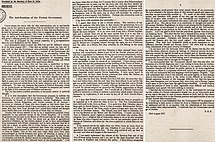Edwin Montagu
The Viscount Peel | |
|---|---|
| Personal details | |
| Born | 6 February 1879 |
| Died | 15 November 1924 (aged 45) |
| Nationality | British |
| Political party | Liberal |
| Spouse(s) | Venetia Stanley (1887–1948) |
| Alma mater | University College London Trinity College, Cambridge |
Edwin Samuel Montagu
Background and education
Montagu was the second son and sixth child of
Political career

Montagu was elected Member of Parliament for
Montagu was a friend of Asquith,
As Secretary of State, Montagu represented the interests of the
He was primarily responsible for the
Anti-Zionism
Montagu was strongly
Family

In 1912, Montagu accompanied the prime minister on holiday in Sicily. H. H. Asquith brought along his daughter Violet, and she in turn brought her friend Venetia Stanley, daughter of Edward Stanley, 4th Baron Stanley of Alderley. It appears that during this holiday, both men fell in love with Stanley.
During the next three years Asquith wrote more and more frequently to her, even during Cabinet meetings. At the same time, Montagu was attempting to court her, unsuccessfully proposing marriage in 1913. She liked him but did not reciprocate his love. Also, Montagu had to marry within his Jewish faith to keep his inheritance. Although Stanley was from a freethinking family and was not a devout Anglican, conversion to Judaism seemed too great a barrier. However, Asquith's epistolary obsession with Venetia and his constant demands for advice apparently became overwhelming even for this intelligent and well-read woman, keenly interested in politics as she was. As a result, she finally accepted Montagu's proposal on 28 April 1915. She converted to Judaism, and the couple were wed on 26 July 1915.
The marriage was unhappy and she had several affairs, including one with the press magnate Lord Beaverbrook.[citation needed] In 1923 a child was born: legally and socially Judith was Montagu's daughter, but she was probably fathered by William Humble Eric Ward.[citation needed] She grew up to befriend Princess Margaret during World War II and marry the American photographer Milton Gendel, with whom she created an artistic salon in Italy.[12] They had one child, Anna Mathias (née Gendel), the god-daughter of Princess Margaret.[13]
Despite his wife's affairs, Montagu's marriage lasted until his death in 1924. The cause of his physical deterioration and death at the age of 45 was unknown, but was thought to be either
See also
References
- ^ Levine, Naomi. Politics, Religion, and Love: The Story of H.H. Asquith, Venetia Stanley, and Edwin Montagu, 1991, p. 83
- ^ "Politics, Religion and Love: The Story of H.H. Asquith, Venetia Stanley and Edwin Montagu" Levine,N.B. pp.29-31: New York; New York University Press; 1991
- ^ "Clifton College Register" Muirhead, J.A.O. pp168/9: Bristol; J.W Arrowsmith for Old Cliftonian Society; April, 1948
- ^ "Montagu, Edwin Samuel (MNTG898ES)". A Cambridge Alumni Database. University of Cambridge.
- ^ About Us, Keynes Society.
- ^ Note, memo, 13 Dec 1916, Milner Papers, box 123, folios 124-8, Roskill, I, p.344-45
- )
- ^ The Deliberations of the Council of Four: Notes of the Official Interpreter Paul Mantoux tr. A. S. Link (Princeton, 1992) vol. 2 p. 99.
- ISBN 978-1-400-06532-5 – via Internet Archive.
- ^ Klug, Brian (15 January 2004). "The myth of the new anti-Semitism: reflections on anti-Semitism, anti-Zionism and the importance of making distinctions". The Nation.
- ^ Montagu, Edwin (23 August 1917). "Memorandum of Edwin Montagu on the Anti-Semitism of the Present (British) Government". Retrieved 7 November 2010.
- ^ "A Six-Decade Roman Holiday". Vanity Fair. November 2011.
- ^ "Montagu, Viscount". Debrett's Peerage (2010),
- ISBN 978-0-8147-5057-5.
Bibliography
- Hankey, Sir Maurice (13 December 1916). "Note on the Composition of the Secretariat of the War Cabinet". Memorandum.
- Montagu, Venetia, ed. (1930). Edwin S. Montagu, An Indian Diary. London: Heinemann.
- Roskill, Stephen P. (1970). Hankey: Man of Secrets. Vol. 2 vols, 1877–1918, 1018–1931. Collins.
- Waley, Sir Sigismund David (1964). Edwin Montagu: A Memoir and an Account of His Visits to India. New York, Asia Pub. House.


